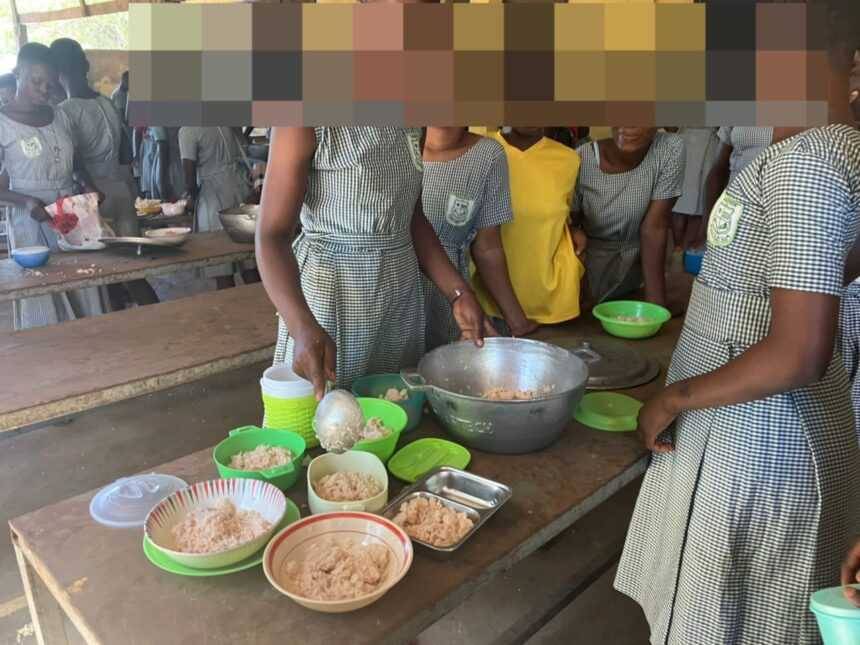Students of Chereponi Senior High Technical School (SHTS) in the North East Region have voiced grave concerns over the quality of food served in their cafeteria. They claim the meals are unhygienic and pose a significant health risk, exacerbated by a cholera outbreak in surrounding areas. The situation has left students living in fear and frequently seeking medical care.
The complaints highlight widespread issues, with students detailing disturbing practices such as the failure to properly clean utensils and the presence of old food particles in meals. They have called for urgent intervention to address what they describe as inhumane conditions.
One student, speaking anonymously, pleaded, “Please help us. The food they are giving us is not good for our health. We need immediate help.â€
Another student lamented, “The treatment here is appalling. The food they serve wouldn’t even be fit for animals. They don’t wash the utensils with soap, and we often find old food particles in our meals. We deserve better.â€
A third student shared a more harrowing account: “We are taking our friends to the hospital almost every day. At least ten to fifteen of us visit the hospital regularly because of stomach pains. It feels like we don’t matter to anyone.â€
Reports from the Chereponi District Hospital confirm these troubling claims. Medical staff revealed that they admit between five and ten students daily, all suffering from stomach-related illnesses. Community members have also observed the frequent sight of students escorting their peers to the hospital, further underscoring the dire nature of the issue.
In response to inquiries, the Headmaster of the school, Fuseini Mohammed, denied knowledge of the problem. “No one has brought this issue to my attention,†he stated. However, students insist they have reported their grievances to school management multiple times but have been met with indifference.
“Management says they can’t change the food provided by the government,†one student explained. “We are not allowed to speak to outsiders about this. We feel trapped and helpless.â€
The implications of these allegations are severe, especially considering the health risks posed by unclean food practices. With cholera cases reported in nearby areas, the lack of proper hygiene in food preparation puts the entire school community at risk of a potential outbreak.
The situation has drawn criticism from local observers who argue that students in public schools deserve the same level of care and attention as those in private institutions. Many are calling on stakeholders, including the Ghana Education Service and the Ministry of Health, to investigate and take swift action.
Parents, too, have expressed anger and frustration, questioning how such a critical issue could go unaddressed. “These are our children. They are the future of this country, and they deserve to be treated with dignity. This is unacceptable,†one parent stated during a community meeting.
Students have taken to social media to amplify their cries for help, sharing images and videos of the poor-quality meals they are served. The posts have sparked outrage and prompted calls for intervention from advocacy groups and local leaders.
The issue of substandard food in public schools is not unique to Chereponi SHTS. Across Ghana, similar complaints have emerged, raising concerns about the overall quality of meals provided under government contracts. Critics argue that the problem stems from systemic lapses in oversight and accountability in school feeding programs.
As the situation unfolds, civil society organizations have pledged to support the students’ cause. Some have called for independent inspections of the school’s cafeteria and food preparation practices, while others are advocating for reforms to ensure such incidents do not recur.
Students at Chereponi SHTS remain hopeful that their voices will be heard. “We just want to be treated like human beings,†one student said. “Is that too much to ask?â€
The plight of these students serves as a reminder of the need for vigilance and accountability in public service delivery. As calls for action grow louder, all eyes are on the relevant authorities to provide a lasting solution to this pressing issue.
It is imperative that schools, as institutions meant to nurture and develop the youth, maintain high standards of care and support. The well-being of students must be prioritized to ensure they can focus on their studies and achieve their potential without unnecessary distractions or health risks.
The situation at Chereponi SHTS is a wake-up call for all stakeholders in Ghana’s education system. The time for action is now, before the consequences become even more dire. Students, parents, and advocates alike await meaningful changes that will restore confidence and ensure a safe, conducive learning environment for all.


